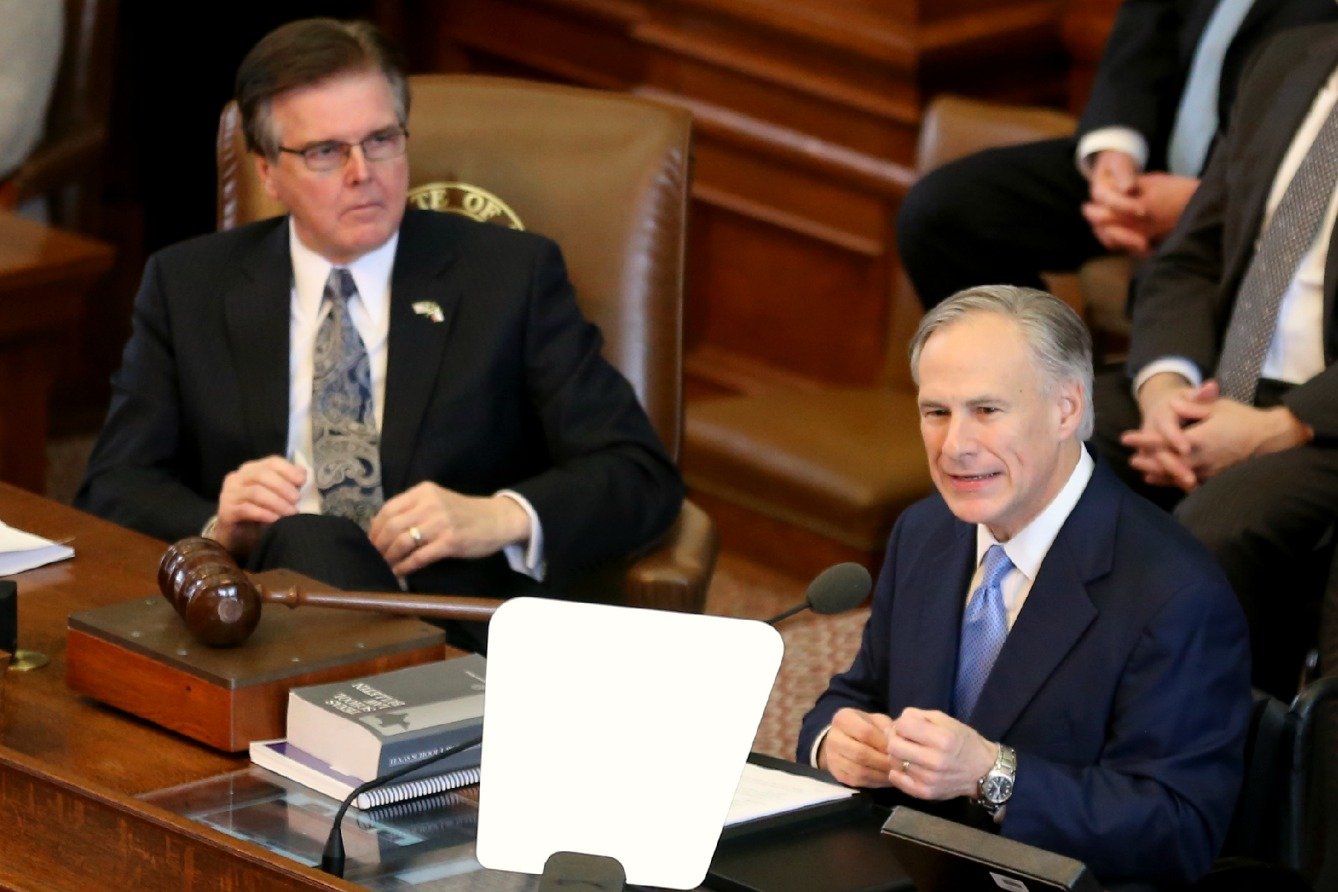
Dan Patrick’s Senate is Moving at a Glacial Pace

Above: Gov. Greg Abbott and Lt. Gov. Dan Patrick at the State of the State Address.
There are only 52 days until the 84th legislative session, in all its 140-day glory, bids us farewell. That’s less time than it sounds. In a little over a month, the final set of bill deadlines will begin to set in, choking any bills that haven’t already gathered momentum.
So how have the two chambers of the Legislature been performing so far? According to an analysis of the Lege through the 83rd day of session conducted by the Professional Advocacy Association of Texas, an association of lobbyists, the Senate has been unusually unproductive these last few months.
PAAT tallied up the bills that have made it past certain benchmarks in the legislative process—voted out of committee, for example—and compared the results to the same point in the last legislative session. It turns out that the House is working at about the same pace as it always has. In 2013, 364 House bills had been voted out of their committees by the 83rd day. This year, 362 had.
But Dan Patrick’s Senate, meanwhile, is moving as slow as molasses. In 2013, the upper chamber had moved 432 bills from committees to the floor. This year, only 229 bills have made the jump, a 47 percent decrease.
The House only passed eight bills by the 83rd day this session, as opposed to 10 in 2013. But the Senate had passed 276 by that point last session—whereas only 98 passed this year, a whopping 64 percent decrease.
Patrick said he never understood why the Legislature let the calendar get so heavy on the back end. Now, presumably, he does.
He trumpeted his rapid appointment of committee chairs as evidence he was getting the ball rolling quickly. Here’s what the Texas Tribune’s Ross Ramsey wrote about Patrick’s attempt to quicken the chamber’s pace at the time:
Naming committees quickly would give the Senate a head start on the House, perhaps setting up a flow of Senate bills to the lower chamber before the House is ready to send anything back.
It’s inside baseball, but it’s important: Legislators actually care whether a law resulted from a Senate bill or a House bill, even if hardly anyone else notices. More importantly, in the back-and-forth interplay of the two legislative chambers, an early start on the Senate side could pressure the House to get going on the upper chamber’s legislation — a subtle way of positioning the Senate’s agenda in front of the House’s own plans.
This was doubtless what Patrick intended, but roughly the opposite has happened. Patrick’s demolition of the two-thirds rule means that Democrats have no incentive to play along, so they’ve been dragging their feet and using delaying tactics. The Senate Republican caucus has been unsteady, with divisions between fire-starting freshmen and the few remaining senior statesmen. The House, by and large, has set the agenda. Patrick is making David Dewhurst look like Bob Bullock.
One easy rejoinder to this would be that the number of bills passed doesn’t reflect how much Patrick has actually advanced his agenda, but he doesn’t have much to show on that front either. The items he set out during his election campaign as his top priorities—he used to say eliminating in-state college tuition for undocumented Texans would be the first thing he’d do, for example—have mostly fallen by the wayside. (Yes, the bid to repeal in-state tuition got a hearing, but faced with strong opposition and little time left in the session, it’s almost certainly dead.)
Speaker Joe Straus’ House is a particularly unreceptive place for the policies Patrick most favors, and there’s not much he can do about it. To take another example: He’s put a great deal of emphasis on school choice in his years of public service, but vouchers are probably dead this session, too, and furthermore he seems to know it.
Instead, Patrick has spent a lot of energy on an incomprehensible tax cut plan, which faces an uncertain future and derision from both Democrats and Republicans. He’s been forced to push for bills, like open and campus carry, that he doesn’t seem to care much about personally.
There’s also the budget, the most important product of any legislative session. Last session, the Senate budget, skillfully shepherded by former state Sen. Tommy Williams (R-The Woodlands), passed out of the Senate Finance Committee by March 13 and was passed by the full Senate on March 20. This session’s Senate budget is… Well, where is it?
State Sen. Jane Nelson, the finance chair, last aired the Senate’s budget proposal (Senate Bill 2) on March 26. On Wednesday, she sent a budget proposal to the Senate floor by altering the House budget proposal (House Bill 1), which arrived in her committee after the lower chamber passed it last week. Next week, probably on Tuesday, April 14, the full Senate will consider the budget for the first time, almost a month behind last session’s pace.
All this is hardly fatal, and the Senate’s say in the budget process isn’t really affected by whether the House or the Senate’s budget bill is used. But it’s a sign that Patrick is letting happen exactly the thing he swore he’d prevent—he said he never understood why the Legislature let the calendar get so heavy on the back end. Now, presumably, he does.
There’s another possible consequence of the slow pace: the dreaded special session. The 83rd Legislature had three special sessions, at a time when everything was working pretty smoothly. Granted, the special sessions were in part caused by Gov. Perry’s desire to fight about social issues; Gov. Abbott doesn’t seem similarly inclined. It’s entirely possible Patrick and Straus tie up their differences with a neat bow by June 1. But what might the Legislature not get done by sine die?


